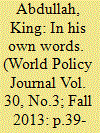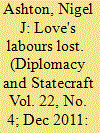|
|
|
Sort Order |
|
|
|
Items / Page
|
|
|
|
|
|
|
| Srl | Item |
| 1 |
ID:
125953


|
|
|
|
|
| Publication |
2013.
|
| Summary/Abstract |
Since the creation of the modern Hashemite Kingdom of Jordan, the monarchs King Hussein and his son, the current ruler King Abdullah II, have presided over a nation that has served as a model of tranquility and security, moving steadily toward an increasingly democratic system of government. As turmoil has shaken all its neighbors, the royal family has managed to guard its sovereignty and independence. King Abdullah II, described as the 43rd generation direct descendant of the Prophet Mohammad, ascended the throne of the Hashemite Kingdom on the death of his father in February 1999. Educated in the United States and Britain, after training at the British military academy at Sandhurst, he served as a major general in the Jordanian Army. During his 14-year reign, the kingdom's economy has flourished, and he has played a major role in encouraging an Israeli-Palestinian peace process. World Policy Journal editors asked His Majesty to illuminate, in his own words, the roots of Jordan's extraordinary record of security and democracy and the unique challenges posed by the complex neighborhood where his nation finds itself.
|
|
|
|
|
|
|
|
|
|
|
|
|
|
|
|
| 2 |
ID:
183989


|
|
|
|
|
| Summary/Abstract |
On 21 March 1968, nine months after the Six-Day War, the IDF launched a military operation against the Jordanian town of Karameh, which served as the headquarters of the Fatah terrorist organisation and a springboard for attacks against Israel. Yet rather than deal Fatah a crushing blow, the operation boosted its strength and prestige. Coming in the wake of the astounding June 1967 victory, the Karameh battle underscored the operational difficulties awaiting the IDF in its prolonged low-intensity warfare against non-state terror organisations.
|
|
|
|
|
|
|
|
|
|
|
|
|
|
|
|
| 3 |
ID:
108887


|
|
|
|
|
| Publication |
2011.
|
| Summary/Abstract |
Relations between Britain and Jordan underwent a revival during the premiership of Margaret Thatcher between 1979 and 1990. Although no longer the dominant power in the Middle East, Britain's membership of the European Economic Community and the close relations between Prime Minister Thatcher and President Reagan meant that Britain was seen by King Hussein as an influential power to be courted. Thatcher shared Hussein's views about the Arab-Israeli peace process and lent him strong support as the voice of Arab moderation. She also sought to use her personal relationship with Hussein as a vehicle to further British interests, particularly through her promotion of British arms sales, both directly to Jordan, and indirectly, through Jordan, to Iraq. This article makes use of a large body of British official documents secured under the Freedom of Information Act and Jordanian documents from the Royal Hashemite Archive in Amman to illuminate the development of bilateral relations over the course of the decade. It concludes by showing how the differing responses of Thatcher and Hussein to the Iraqi invasion of Kuwait in August 1990 ruptured their relations. Drawing on sources which have previously been unavailable the article offers a fresh perspective on important aspects of the international history of the Middle East during the 1980s.
|
|
|
|
|
|
|
|
|
|
|
|
|
|
|
|
| 4 |
ID:
184341


|
|
|
|
|
| Summary/Abstract |
This article examines Jordanian postage stamp depiction of the West Bank as part of the Hashemite Kingdom from 1952 to 1985. The majority of maps of the West Bank are featured as part of Jordan, both during Jordanian rule of the West Bank (1948–1967) and after Israel conquered the land during the 1967 war. Sometimes the West Bank is delineated from Jordan to suggest a territorial dispute with Israel, while other times, the West Bank is shown as part of Palestine. The ambiguous representations of the West Bank as Jordanian territory, disputed territory, and Palestinian territory reinforce Hashemite sovereignty claims to the West Bank while also supporting Palestinian rights and acknowledging Jordanian rule of the West Bank was conditional upon settlement of the Palestinian issue. Finally, this analysis seeks to explain why stamps stopped showing the West Bank as part of Jordan in 1985, three years before the kingdom formally severed all legal and administrative ties to the land.
|
|
|
|
|
|
|
|
|
|
|
|
|
|
|
|
|
|
|
|
|